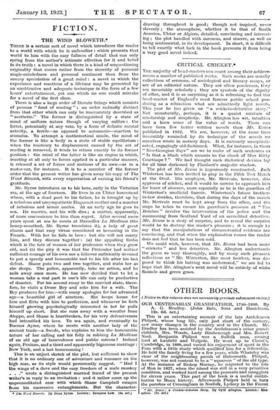CRITICAL CRICKET.* THE majority of head-masters can count among their
achieve- ments a number of published works. Such works are usually collections of sermons, of sociological and literary essays, or are of an editorial nature. They are often ponderous, they are invariably scholarly ; they are symbols of the dignity of office, and it is as surprising as it is refreshing to find the head-master of England's most famous public school pro- ducing as a relaxation what are admittedly light novels. This year he has given us " a cricketo-detective story." Not unnaturally, perhaps, it is a quaint mixture of scholarship and simplicity. Mr. Alington hen wit, intuition and a keen sense of the value of words. There can have been few better written novels than Mr. Evans published in 1922. We are, however, at the same time irresistibly reminded by its technique of the novels we ourselves wrote in nursery days. It is curiously unsophisti- cated, engagingly old-fashioned. What, for instance, in these " Neo-Georgian days" are we to make of such sentences as " Is that a blush which mounts to the cheek of Miss Kitty Courthope ? " We had thought such rhetorical devices lay for all time darkened by Flaubert's majestic shadow.
The plot of Mr. Evans is ingeniously constructed. Jack Winterton has been invited to play in the Fifth Test Match at the Oval. His employer, Mr. Merivale, however, dis- approves of cricket, and it would be unwise to approach him for leave of absence, more especially as he is the guardian of Winterton's unofficial fiancee. Winterton's future brother- in-law decides, therefore, that during the days of the match Mr. Merivale must be kept away from the office, and the steps he takes to ensure his guardian's presence at " The Beeches " involve the intervention of the police and the summoning from Scotland Yard of an accredited detective. Mr. Evans is a story of surprise, and to reveal the surprise would be to destroy the reader's pleasure ; it is enough to say that the manipulations of circumstantial evidence are convincing, and that when the explanation comes the reader does not feel that he has been sold.
We could wish, however, that Mr. Evans had been more " cricketo " and less detective. Mr. Alington understands the game so very thoroughly, and by many such pleasant reflections as " Mr. Winterton, like most bowlers, was dis- posed to think his batting was underrated," we are led to hope that Mr. Alington's next novel will be entirely of white flannels and green grass.














































 Previous page
Previous page